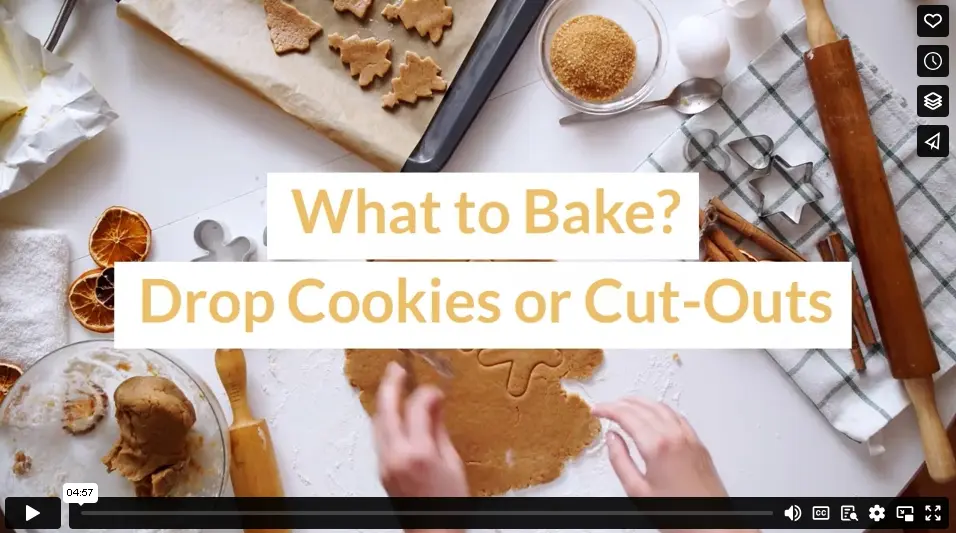There are a few differences between drop cookies and cut-out cookies. Both techniques produce decadent desserts we love to eat. Let’s take a closer look at what’s involved in baking both types of cookies.

(Pixabay/pexels)
Preparation Time
If you love to bake cookies, your first, and probably easiest, decision is how much time you want to spend in the kitchen. If time is limited, drop cookies are the best choice. They are simple to make—just mix the ingredients and drop by spoonful onto a cookie sheet.
Drop cookie varieties such as chocolate chip, peanut butter, pumpkin, and oatmeal raisin are popular, delicious, and quick to prepare. Drop cookie dough is soft, so it’s easy to get onto the pans.
If you have more time to invest in a baking project, cut-out or “rolled” cookies are a fun and delicious option. (They are called “rolled” cookies because you roll the dough flat before cutting it into shapes.)
Cut-out cookies require extra steps but give the baker more control over appearance. You have to prepare the dough, chill it, roll it out, cut the cookies, bake them, and cook them on a rack. Popular cut-out cookies include sugar and gingerbread.
Texture
The two cookie techniques also differ in texture. Drop cookies can be as thick as you like. They will have an uneven texture and may take on more of a mound shape and are usually soft and chewy. (Think of a big, gooey and chewy chocolate chip cookie.)
On the other hand, you can control how thin or thick you want your cut-out cookies based on how you roll out your dough. If you choose to roll your dough thin, your cookies will likely be crisp and crumbly.
Appearance
Drop cookies tend to spread out while baking, producing shapes that vary. You can potentially frost drop cookies (like frosting a chocolate dropped cookie with chocolate mint icing or a pumpkin cookie with a dollop of cream cheese frosting), but you won’t be frosting a super smooth surface, so these will not be picture-perfect cookies.
With cut-out cookies, the dough tends to be firmer and keeps its shape in the oven. They’ll come out with uniform shapes and flat surfaces. You can ice or frost your cookies and decorate with all kinds of embellishments. Cut-out cookies can be works of art!
Baking Tips
Want perfect drop or cut-out cookies? Follow these steps.
All-purpose Tips:
- Always read the recipe first to make certain you have all the ingredients on hand.
- Check the dates on your baking powder and baking soda. They need to be unexpired for your cookies to rise. Test the freshness by placing a tiny amount of baking powder or baking soda in vinegar. If it bubbles, it’s still good to use.
- Measure ingredients with care.
- Use measuring cups for dry ingredients, and level the amount with a knife.
- Use clear glass measuring cups for wet ingredients. Check accuracy by placing the measuring cup on the counter to read at eye-level.
- For sticky ingredients, such as corn syrup or honey, spray the cup with cooking spray before measuring. This will ensure that the full amount makes it into the mixing bowl.
- For best results, eggs and butter should be at room temperature.
- Beat eggs into the dough one at a time.
For Drop Cookies:
- A cookie scoop is a great tool for scooping your dough onto the baking sheet, ensuring that cookies bake evenly and come out close to the same size.
- Place the cookie dough on the baking sheets with enough room between scoops to allow them to expand without running together.
- Cookies bake best on the middle oven rack.
- Keep the oven door closed during baking, so the temperature doesn’t fluctuate.
- Store cooled cookies in airtight containers.
For Rolled Cookies:
- Refrigerate the dough. This will make it easier to roll out, and the cookies will maintain their shape while baking.
- To prevent the dough from sticking to the counter, place it between sheets of parchment paper to roll out.
- Lightly dusting the countertop and rolling pin with flour is an option for less-sticky dough.
- Begin rolling in the center of the dough mound. Don’t start with the edges, or you will risk making them too thin.
- Decide how thin to roll out your cookies. One-quarter inch will hold up better than one-eighth inch, but you will get more cookies out of thinner dough.
- Cut out the cookies as close as possible to minimize waste. Gathering the scraps to roll out again can only be done a few times before the dough becomes too tough.
- For very thin cookies, roll and cut out on parchment paper. Remove the dough in between the shapes and put the paper directly on the pan to bake.
- After baking, quickly transfer cookies to cooling racks. Don’t leave them on the warm pans because they’ll continue to bake and get too crispy.
- Once cooled, you are ready to decorate.
Rolled cookies may take more time to produce, but what would the holidays be without decorated Christmas or Valentine’s cookies and gingerbread houses? Drop cookies can be produced quickly and with less effort. Whether you want to spend just an hour or all day in the kitchen, either style of cookie will satisfy your sweet tooth.
Video
Infographic
Drop cookies and cut-out cookies have several differences. Both techniques create delicious desserts that we love to enjoy. Explore the processes involved in baking each type of cookie in this infographic.


